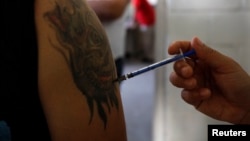Researchers have known for some time that men tend to experience more severe influenza and get sicker from microbial infections than women. A new study suggests it may be that immune responses in men are affected by the male hormone testosterone.
In a small study involving 53 women and 34 men, researchers at Stanford University in California measured their antibody response to the 2008-2009 seasonal flu vaccine. Vaccines stimulate the production of antibodies, which are the immune system’s first line of defense against microbial invaders.
As predicted by previous research, the vaccine stimulated a stronger antibody response in women than men.
Lynda Chiodetti runs the National Institutes of Health section that helped fund the study. She said the investigators identified a cluster of genes in the male participants that is associated with lipid or fat metabolism. Many of those genes are regulated by testosterone.
“They found that was somehow suppressing the immune response. They don’t really understand the mechanism of this but it’s an interesting finding,” said Chiodetti.
Chiodetti says male participants with the highest levels of testosterone had a weaker antibody response than those with lower levels of the hormone.
Stanford researchers now plan to investigate other immune system cells to see whether they are also affected by testosterone.
The findings on gender differences in response to the flu vaccine are published in the journal Proceedings of the National Academy of Sciences.
In a small study involving 53 women and 34 men, researchers at Stanford University in California measured their antibody response to the 2008-2009 seasonal flu vaccine. Vaccines stimulate the production of antibodies, which are the immune system’s first line of defense against microbial invaders.
As predicted by previous research, the vaccine stimulated a stronger antibody response in women than men.
Lynda Chiodetti runs the National Institutes of Health section that helped fund the study. She said the investigators identified a cluster of genes in the male participants that is associated with lipid or fat metabolism. Many of those genes are regulated by testosterone.
“They found that was somehow suppressing the immune response. They don’t really understand the mechanism of this but it’s an interesting finding,” said Chiodetti.
Chiodetti says male participants with the highest levels of testosterone had a weaker antibody response than those with lower levels of the hormone.
Stanford researchers now plan to investigate other immune system cells to see whether they are also affected by testosterone.
The findings on gender differences in response to the flu vaccine are published in the journal Proceedings of the National Academy of Sciences.




